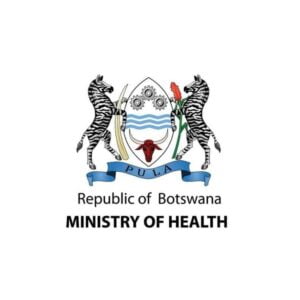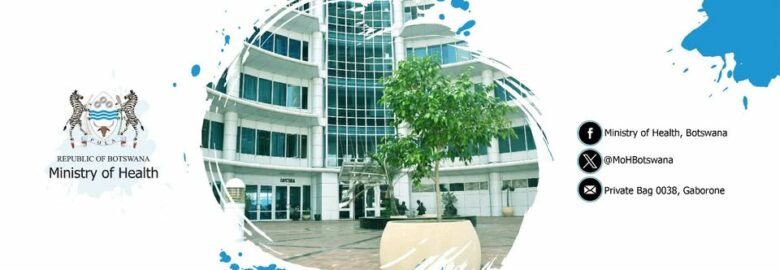
Ministry of Health
#HealthyBotswana
- To manage the provision of quality, affordable; preventive, rehabilitative and treatment health services to the nation.
- To promote health
- To promote patient care services
- To promote organizational excellence
- Health Policy Research and Development
- Health Services Monitoring & Evaluation (M&E)
- Health Services Management
- District Health Management Teams (DHMTs)
- Corporate Services
Health Policy Research and Development
To provide oversight and overall strategic direction for the health sector, guided by accurate data, in close collaboration with all stakeholders. This is aimed at ensuring that all policies, strategies and plans are up to date, in line with national priorities and international treaties, and are available to all stakeholders.
Health Services Monitoring & Evaluation (M&E)
This function will provide oversight and ensure that the ministry policy, strategic direction and expectations are fullfilled through monitoring, impact analysis and reporting on the performance of the health delivery system and quality assurance interventions.
- Quality assurance functions will identify and address challenges in adherence to norms and standards in the implementation of health care interventions, ensuring that systems are in place to guarantee quality improvement and patient safety, and coordinating customer care interventions across the health sector.
Health Services Management
This function will provide oversight and ensure that national and international developments in health disciplines (Community Health Services, Intergrated Health Services, and Clinical Support Services) are addressed appropriately. It will also manage the delivery of effective, efficient, appropriate, accessible, responsive and evidence based health services at the district level.
The responsibility for the provision of integrated and specialised health services has been delegated to National Referral Hospitals(NRHs) and District
Health Management Teams (DHMTs).
District Health Management Teams (DHMTs)
District Health Management Teams will provide oversight and management of health service delivery in clinics and hospitals at health district level. The major functions of the District Health Management Teams will be as follows:
- Community Health Services – will coordinate all community health functions across the health sector at district level (disease surveilance, environmental and occupational health, school health, port health, disaster preparedness & response, health promotion & education, rehabilitation) and provide technical support to the different programmes.
- Integrated Health Services – will cluster the functions related to public health, clinical services, HIV & AIDS and other vertically implemented programmes to promote integration of services and continuum of care; patient care – management & safety, disease control, sexual reproductive health, child & adolescent health, nutrition & food control, oral & dental health, mental health, emergency medical service.
- Clinical Support Services – will oversee and coordinate all clinical support services that enable the provision of quality services, i.e. laboratory services, imaging, pharmacy, biomedical engineering, blood transfusion services, organ donation. These support services are highly technical in nature and will work in close collaboration with specialised service delivery points, e.g. referral hospitals and national / regional reference laboratories, etc.
- Central Medical Stores (CMS)– CMS currently operates as a government-owned enterprise and its core functions include national procurement of healthcare commodities, storage and handling of inventory commodities, and distribution of commodities to various sections of the national public health system.
Corporate Services
To provide oversight and management of support services for the whole ministry:
- Corporate Services – Human resource Management and Administration, and Development and Finance.
- Procurement and Project Management – Procurement Coordination & management, Contract Management, Facilities Management



